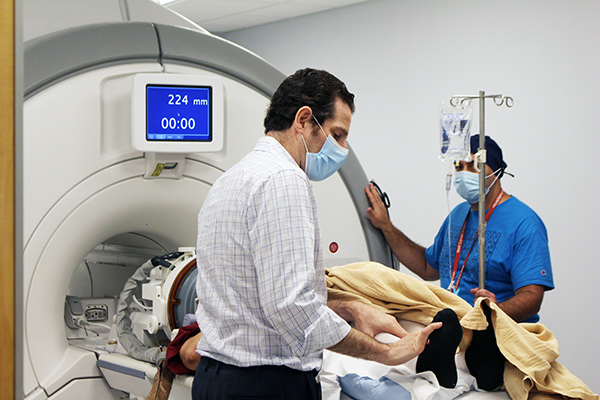
Expanded use of focused ultrasound opens new options for patients with advanced movement disorders
The U.S. Food and Drug Administration (FDA) has approved the use of staged bilateral focused ultrasound for the treatment of advanced Parkinson’s disease, marking a significant advancement in care for patients whose symptoms are not adequately controlled by medication.
The expanded indication allows for staged bilateral pallidothalamic tractotomy using the Exablate Neuro platform, a noninvasive, MRI-guided focused ultrasound system that treats targeted areas of the brain without incisions or implanted hardware.
The clinical trial supporting FDA approval was led by Dr. Michael Kaplitt, vice chair for research in the Department of Neurological Surgery at Weill Cornell Medicine and a neurosurgeon at NewYork-Presbyterian/Weill Cornell Medical Center.

Michael Kaplitt, MD, PhD
“This new indication represents a significant step forward in how integrated movement disorder teams will approach the treatment of Parkinson’s disease,” said Dr. Kaplitt. “As the lead investigator of the clinical trial evaluating the safety and effectiveness of the staged bilateral procedure with the Exablate system, I’m encouraged by the results and excited about what it offers my patients.”
Dr. Kaplitt’s leadership in focused ultrasound research has helped shape the field of noninvasive neurosurgery. He previously led trials for FDA-approved applications of the technology in essential tremor, tremor-dominant Parkinson’s, and unilateral pallidotomy for Parkinson’s-related dyskinesia.
The FDA’s decision was based on results from a multi-center international trial conducted across nine sites in the U.S., Europe, and Asia. Full study findings are expected to be published later this year.
This milestone underscores Weill Cornell Medicine’s role at the forefront of patient-centered innovation in movement disorder care, alongside its longstanding leadership in Parkinson’s disease treatment and neurosurgical research.
Learn more about our comprehensive care for Parkinson’s disease and movement disorders: neurosurgery.weillcornell.org/service/parkinsons-disease-and-movement-disorders